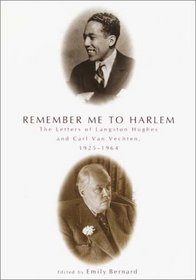Search -
Remember Me to Harlem: The Letters of Langston Hughes and Carl Van Vechten, 1925-1964
Remember Me to Harlem The Letters of Langston Hughes and Carl Van Vechten 19251964
Author:
These engaging and wonderfully alive letters paint an intimate portrait of two of the most important and influential figures of the Harlem Renaissance. Carl Van Vechten--older, established, and white--was at first a mentor to the younger, gifted, and black Langston Hughes. But the relationship quickly grew into a great friendship--and for nearly... more »
Author:
These engaging and wonderfully alive letters paint an intimate portrait of two of the most important and influential figures of the Harlem Renaissance. Carl Van Vechten--older, established, and white--was at first a mentor to the younger, gifted, and black Langston Hughes. But the relationship quickly grew into a great friendship--and for nearly... more »
ISBN-13: 9780679451136
ISBN-10: 0679451137
Publication Date: 2/13/2001
Pages: 400
Edition: 1st
Rating: ?
ISBN-10: 0679451137
Publication Date: 2/13/2001
Pages: 400
Edition: 1st
Rating: ?
0 stars, based on 0 rating
Genres:
- Biographies & Memoirs >> Arts & Literature >> Authors
- Biographies & Memoirs >> Community & Culture >> Black & African American
- Biographies & Memoirs >> Community & Culture >> General
- Biographies & Memoirs >> General
- Literature & Fiction >> World Literature >> United States >> Black & African American >> Hughes, Langston
- Literature & Fiction >> Letters & Correspondence




